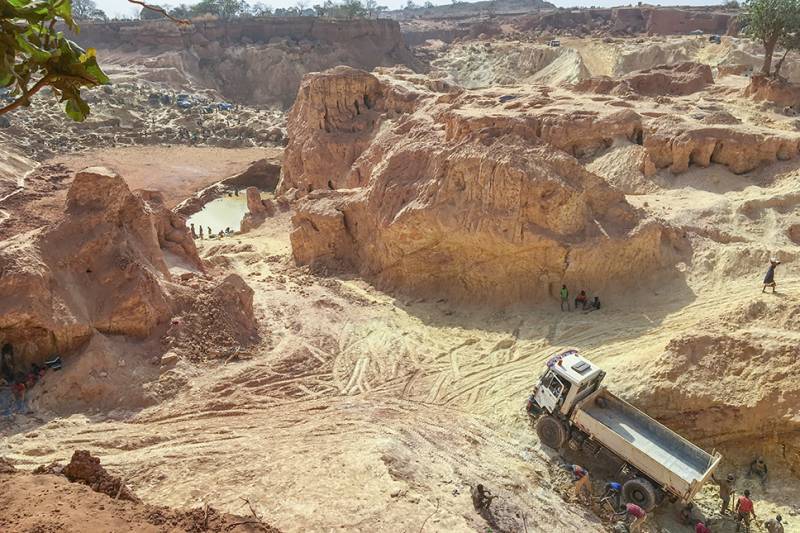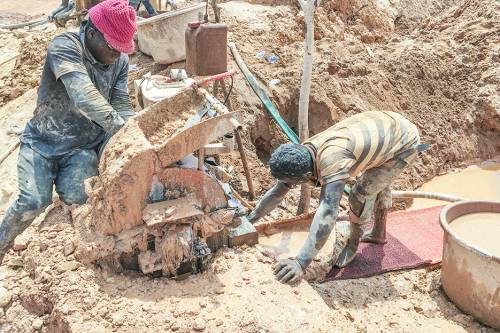Ancient West African tradition anticipated sustainability discussion

In many cases the traditional system has increasingly been replaced by an “extractivist logic” where people take as much gold as they can. Photo: Cristiano Lanzano
Persian chronicler Ibn el Faqih in the tenth century noted how people in the mineral-rich Birimian belt in West Africa would “extract gold like farmers cultivate carrots”. Only recently have miners in the area started to abandon traditional ritual procedures that limit how much gold is taken from the ground. NAI researcher Cristiano Lanzano went to eastern Guinea to study how miners in the Birimian belt relate to contemporary debates about sustainability and intergenerational justice.
Lanzano recently conducted fieldwork in eastern Guinea, with colleague Luigi Arnaldi di Balme (IFSRA, Ouagadougou), as part of the research project Gold Matters – Exploring Transformations to Sustainability in Artisanal and Small-scale Gold Mining External link, opens in new window..
External link, opens in new window..
“I was curious about how people look at sustainability in an area where gold production historically has been deeply embedded in the social structure”, explains Lanzano, a social anthropologist with long experience studying artisanal mining in Burkina Faso and Guinea.
While the term ‘sustainable mining’ is problematic – because gold, unlike carrots, is not a renewable resource – it can also be interpreted more widely, in the context of a growing debate about the socio-ecological processes of mining, its effects on the environment and conditions for future generations.
Lanzano says that historically in eastern Guinea customary chiefs and councils of elders would control how mining was organised. For example, ritual procedures were used to determine the proper time to begin the mining season and the right location in the fields. Mining pits would be dug in regular rows, with carefully measured spaces between the holes. Gold was extracted according to the principle of alternation, leaving a field to rest for 3-7 years before using it for extraction again.
“It was a system which echoed the fallow principle in agriculture. In a sense, it anticipated today’s discussions on sustainability and intergenerational justice”, Lanzano says.
According to artisanal miners interviewed by Lanzano, in many cases the traditional system has increasingly been replaced by an “extractivist logic” where people take as much gold as they can.
“Yes, we used to let the fields rest. But now, if you look in one direction there is a big mining company; if you look in another direction there is no gold left”, one artisanal miner said.

Miners in eastern Guinea. Photo: Cristiano Lanzano
Taking a broader perspective, the changing nature of gold extraction must be seen in the light of increased global demand for minerals over the past decade, Lanzano explains. He adds that the gold extraction phase has been further accelerated by increased availability of cheap, often Chinese-made, technologies such as metal detectors and stone crushers.
During the global commodities boom, which started in the 1990s, many resource-rich African nations liberalised their trade policies to create favourable environments for international investors. However, as a counter-reaction, some are now pushing for fairer taxation and use of local workforce and resources to safeguard their interests – a trend that has been described as the re-emergence of “resource nationalism” in Africa.
The evolution of the global extractive sector and what it means for Africa is one of the topics of an upcoming policy dialogue, Opportunities and Challenges for the Extractive Sector in Africa, in Abidjan, Côte d’Ivoire, on May 6-7. Lanzano will take part in the event with NAI senior researchers Jörgen Levin and Cristina Udelsmann Rodrigues and NAI Head of Research Victor Adetula.
The policy dialogue will be attended by mining experts, representatives from international organisations and civil society, and academics, who will take part in discussions and exchange knowledge.
The main focus will be on the large-scale industrial sector, but many issues – such as globalisation vs local and national interests, sustainability and the effects of technical innovations – are equally relevant for smaller actors, according to Lanzano, who focuses on artisanal mining in his work.
“In my fieldwork in eastern Guinea, I was looking at sustainability from different perspectives, trying to question preconceived ideas about mining. I am curious about how these debates can be continued in Abidjan.”
TEXT: Mattias Sköld
Policy dialogue
“Opportunities and Challenges for the Extractive Sector in Africa“ Policy dialogue organised by the Nordic Africa Institute and the African Development Bank (AfDB), Abidjan held on 6-7 May 2019 in Abidjan, Côte d’Ivoire.
The event brings together stakeholders to discuss new trends in Africa’s mining sector.
